Participants at the Fifth World Litvak Congress commemorated Holocaust victims at the Ponar Memorial Complex outside Vilnius today. The commemoration included paying respects and reciting kaddish for the dead.
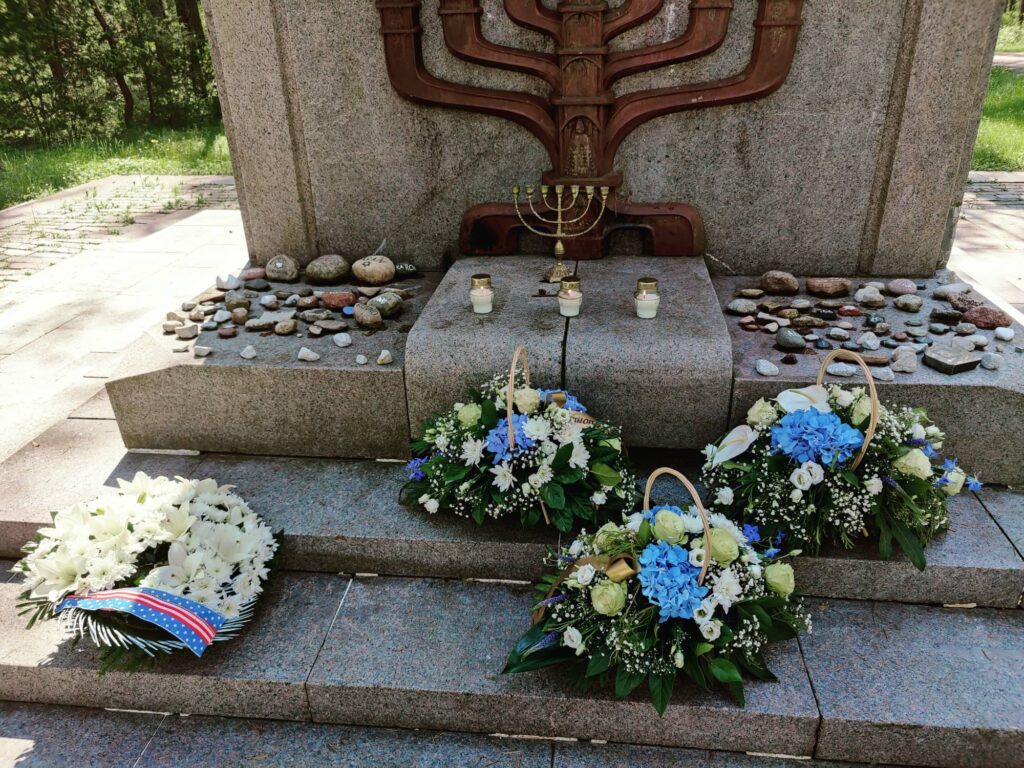
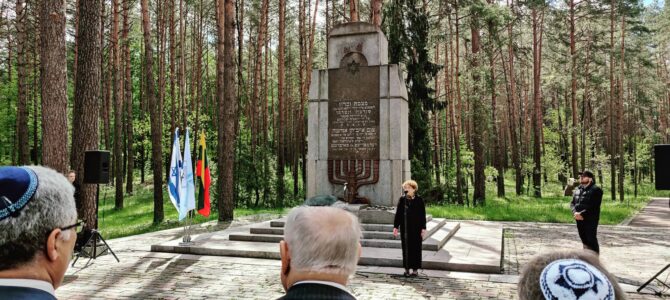
Participants at the Fifth World Litvak Congress commemorated Holocaust victims at the Ponar Memorial Complex outside Vilnius today. The commemoration included paying respects and reciting kaddish for the dead.

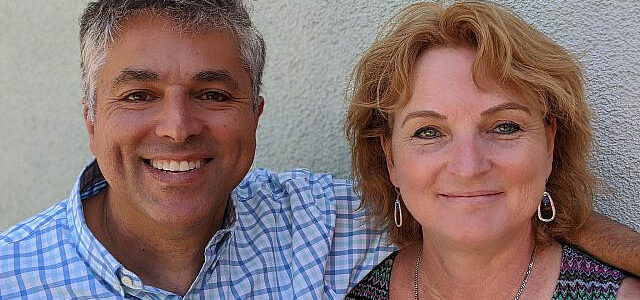
by Efraim Zuroff, Times of Israel
photo: Grant Gochin and Silvia Foti, June, 2020.
What a shame that those who work to bring Lithuania’s large-scale participation in Holocaust crimes to light cannot be honored by the Jewish community there
This week the Lithuanian Jewish community is hosting the “Fifth World Litvak Congress” in Vilnius (Vilna) from Sunday, May 22 until Thursday, May 26. In theory, the event is open to any Jew of Lithuanian origin and anyone who has a meaningful connection to the history, politics or culture of Lithuanian Jewry.
The program features an opening event in the Lithuanian Seimas (Parliament), cultural events, as well as visits to Kaunas (Kovno), Panevezys (Ponevitch), Seduva (my grandmother’s birthplace), and other sites of Jewish interest. The congress will also be addressed by Lithuanian politicians, such as Seimas Speaker Viktorija Čmilyté-Nielsen, the patron of the congress, foreign experts on combatting anti-Semitism, such as European Commissioner Katharina Von Schnurbein and former Canadian Justice Minister Irwin Cotler, as well as scholars who are experts on aspects of Lithuanian Jewish history, such as American Professor David Fishman and Israeli Dr. Ben-Tsiyon Klibansky.
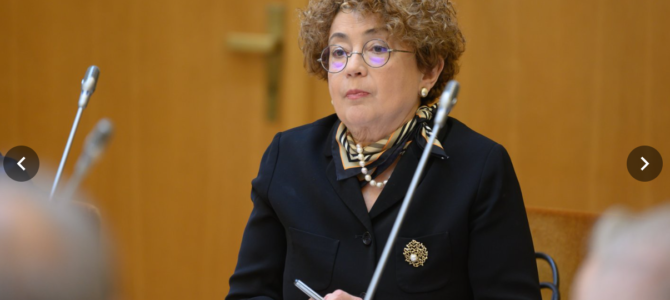
by Birutė Vyšniauskaitė, lrytas.lt
Jews in Lithuania: a still undiscovered or an already-lost shared history? Human rights, modern anti-Semitism. Recording Lithuanian Jewish culture for posterity. These and many other topics touching on Lithuanian Jewish culture, the Holocaust and culture were discussed the current Fifth World Litvak Congress.
The Congress was supposed to have been held two years ago on the 300th anniversary of the birth of Eliyahu ben Solomon Zalman, the Vilna Gaon, the renowned rabbi, kabbalist and student of the Torah and Talmud. …
[I asked] Faina Kukliansky, the chairwoman of the Lithuanian Jewish Community who was born and grew up in Lithuania, what it means to be a Litvak.
“My dad used to say his grandchildren were born in Lithuania and therefore bore the seal of quality, and were fit for export,” Kukliansky joked.
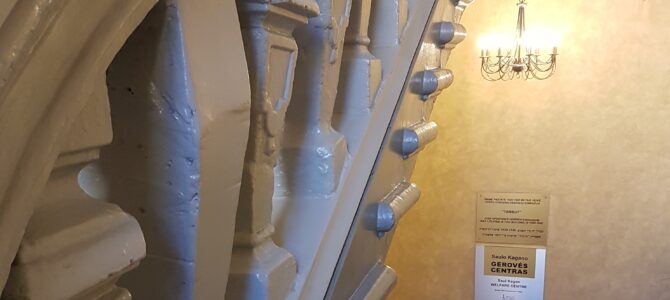
The Lithuanian Jewish Community has just opened the long-awaited Saul Kagan Welfare Center, paying tribute to the long-serving director of the Conference on Jewish Material Claims against Germany by renaming the Community’s social care and welfare center after him. Staff and clients attended the ceremony where LJC executive director Michail Segal and the Center’s first director Simas Levinas spoke. LJC chairwoman Faina Kukliansky unveiled the new plaque commemorating Saul Kagan. Arie Buchesiter from the Claims Conference, Saul Kagan’s daughter Julia Kagan-Baumann and Israeli ambassador to Lithuania Yossef Avni-Levy also attended the event. The Fayerlakh group performed a concert at the event.
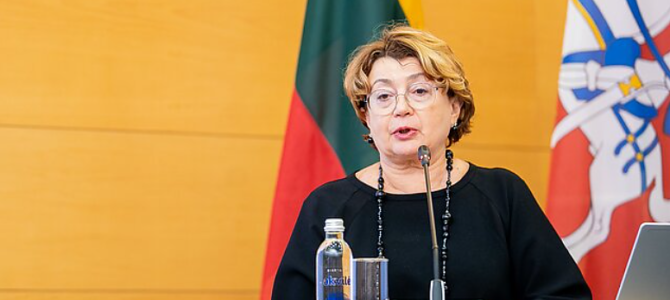
15min.lt, BNS
The Fifth World Litvak Congress kicked off at the Lithuanian parliament Monday.
Lithuanian Jewish Community chairwoman Faina Kukliansky said this congress sends the message that Jewishness isn’t just a thing of the past in Lithuania.
“Today we invite you to an open discussion on the future of Litvak culture and the importance of passing this culture on to our children and grandchildren,” she said. “I am certain the Lithuanian state has an interest in making all Litvaks from around the world feel at home in their native land.”
Parliamentary speaker Viktorija Čmilytė-Nielsen used the opportunity to talk about the Ukraine.
Besides the academic conference Monday, an exhibit called “Almanach of Litvak Culture in the 21st Century” was also opened. Topics at the conference included fighting anti-Semitism, Litvak history and education, among others.
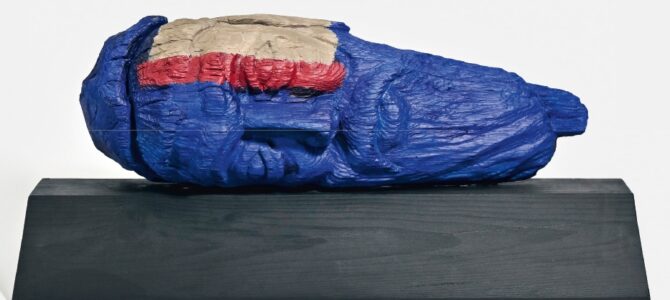
An exhibit of works by Daumantas Lovas Todesas called “The Wanderings of Moses” opened at the Žiežmariai synagogue located at Vilniaus street no. 6 in Žiežmariai on May 23. The exhibit will run till June 9. Visitors can visit from 10:00 A.M. to 4:00 P.M. on weekdays, or arrange a different time for touring the exhibit and synagogue by calling +370 682 19944. This exhibit was jointly organized by the Vilnius Jerusalem of Lithuanian Jewish Community and the Žiežmariai Cultural Center.
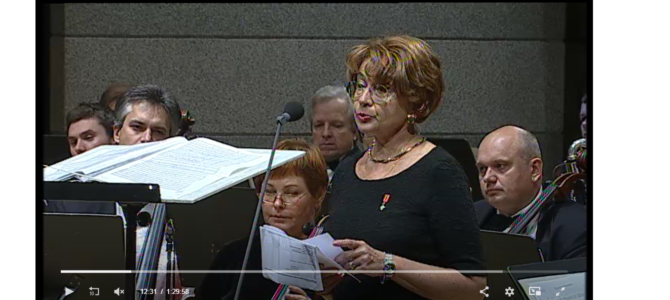
The Fifth World Litvak Conference is taking place from May 23 to May 26.
Registration has been closed for the opening ceremony at the Lithuanian parliament. If you want to register for the other events concluding on Sunday evening, register now.
The registration form is here.
Watch the opening ceremony almost live here:
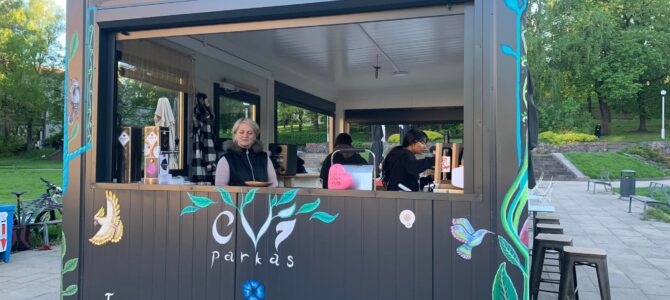
“Cvi in the Park” is once again welcoming the citizens of Vilnius and city’s guests! The project was set up during the corona virus pandemic in order to continue the operation of the famous Bagel Shop Café under strict government-imposed restrictions. This is how the new open-air café “Cvi in the Park” was born, which is now reopening for the summer season.
The word “cvi” or “tzvi” itself means “doe” in Hebrew and given the divisive history of the square and the surrounding atmosphere of the park, it was decided to accommodate this “doe” in Cvirka Square, for the sake of dialogue and tolerance. We hope that this revived summer tradition will give a fresh face to this old square in front of the Lithuanian Jewish Community. We are ready to be a reliable partner to the Vilnius city municipality in the creation and development of a distinctive, sustainable identity for Cvirka Square.
At “Cvi in the Park” we offer healthy Israeli street food such as falafels, hummus, pita, etc., together with fresh vegetables grown locally and a unique blend of Middle Eastern spices and chickpeas. The menu is vegan-friendly and all organic ingredients are carefully selected based on seasonality. We hope our visitors will also enjoy the new and unique flavors of plant-based food. We are very happy to be cooperating with the craft beer experts Genys Brewing and true wine lovers New Skanu.

We wish a very happy milestone birthday next week to Vilnius ghetto survivor and Jewish partisan Fania Brantsovskaya.
You were about to begin university when the Germans invaded on June 22, 1941. When they ordered your family into the Vilnius ghetto, you crossed the street, Pylimo, to the Jewish Hospital section of the ghetto between Pylimo and Ligoninės streets. You joined the FPO, carried out sabotage missions against the Lithuanian Nazis, fought in the forests and marched into Vilnius with the Red Army when the Soviets liberated the Lithuanian capital. Although the fascists murdered your entire family, you stayed in the country and continued fight for a better future. After your husband passed away, you devoted yourself to telling the truth to the younger generations about the Holocaust and how Jews didn’t go like lambs to the slaughter, but fought tooth and nail, and prevailed against their oppressors.
We salute your bravery, your decision to fight and the life you devoted to telling the truth and serving humanity in your native land.
Mazl tov. Bis 120!
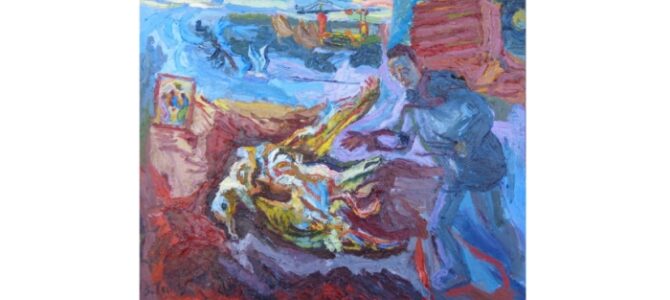
The Pylimo Gallery located at Pylimo street no. 30 in Vilnius is to host an exhibit of paintings by Solomon Teitelbaum called “Prayer to a Seagull” starting May 17. The exhibition will run till June 4.
Full description in Lithuanian available at the gallery’s website here.
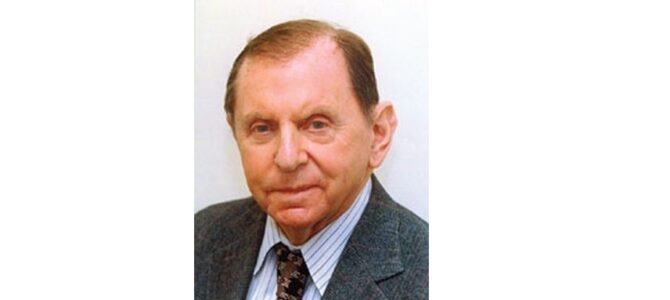
Saul Kagan, who fled Lithuania, spent decades leading the Jewish welfare organization which was primarily responsible for restitution worth more than $70 billion to Holocaust survivors and their descendants.
Saul Kagan came the to the USA in 1940 after losing his mother and brother to the barbarity of the Nazis. In 1951 he became the director of World Jewish Congress responsible for material claims by Jews against Germany. B’nai B’rith and other Jewish organizations brought an unprecedented claim, demanding reparations from “the heirs of the state of the Third Reich,” meaning West Germany, for the Nazi genocide against the Jews of Europe.
Kagan’s agreements signed over the following fifty years demanded the governments of West Germany and Austria and a falange of fascist corporations compensate people who survived the Holocaust for the houses, homes, buildings, furniture, art and other property seized from them during the Nazi era. They also demanded the payment of pensions, stipends and aid to the elderly they otherwise would have had if they hadn’t been persecuted instead, as well as compensation for hundreds of thousands of Nazi prisoners, Jews and non-Jews, used as slave labor by Germany’s industrial giants, corporations such as IG Farben and Krupp.
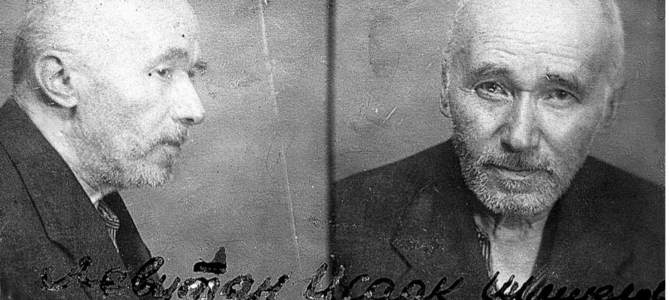
The Kaunas Jewish Community invites you to the unveiling of a plaque commemorating Dr. Isaac Levitan, the “angel in a white lab coat,” at 3:00 P.M. on May 19 at the doctor’s former address, Miško street no. 27 in Kaunas.
This is where Levitan set up his first private clinic in 1926. It quickly became known as Dr. Levitan’s Women’s Clinic. Amazingly, the building has stood unchanged since that time. It now houses the Christian Healing House which has delivered a large number of babies over several generations in Kaunas.
The doctor’s family didn’t fare as well during World War II. His son (also a doctor and gynecologist) and daughter-in-law were murdered in the Kaunas ghetto. Levitan, Sr., and his wife were deported by the Soviets twice. He died in exile in Krasnoyarsk oblast in 1956. His grandson Uri after many journeys finally ended up in Israel, thanks to fearless people.
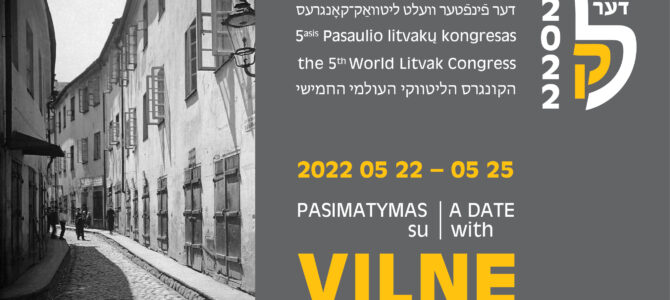
The Fifth World Litvak Congress will be held on May 23-26, organized by the Lithuanian Jewish Community. We invite you to join the events and enjoy Litvak culture, heritage, history and music. Share the news with your relatives, friends and colleagues.
Pre-registration is required by filling out the following form:
https://forms.gle/VJa9nMHaHjH4t5Lf6
The program may be found here:
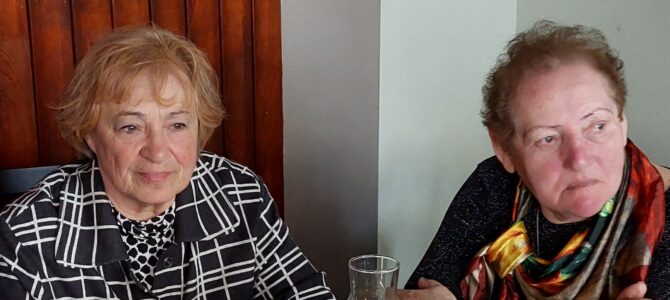
Members of our Community met on sunny May 8 to mark the end of World War II, an end without which none of us would likely be alive.
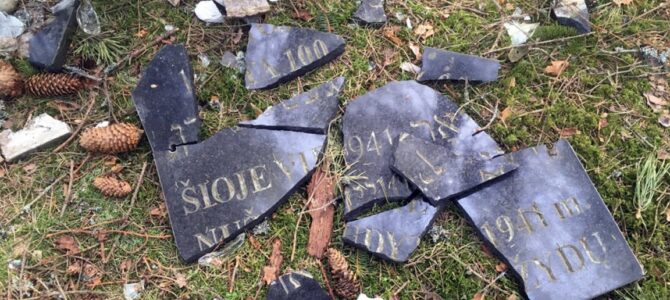
A monument commemorating the mass murder of Jews has been vandalized near the town of Darbėnai in Lithuania’s Kretinga District.
A town resident noticed the vandalism while walking the in White Mountain Forest on Tuesday, May 10, 2022. The man reported the vandalism to the aldermanship after which the police were contacted about the incident.
The monument marked the site where about 320 Jewish women and children were shot to death in 1941. The site was recognized as a protected cultural heritage site with historical and commemorative values. Now the site contains a single stone marker, a broken stone plaque, vodka bottle shards and a swastika scratched on the commemorative stone.
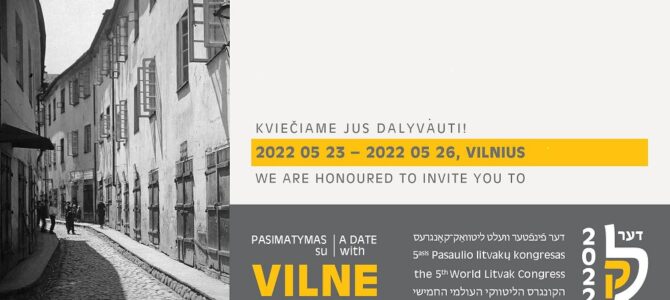
The following is the program of events for the Fifth World Litvak Congress to be held in Vilnius from May 23 to May 26, 2022.
A PDF file of the program can be downloaded here.
§§§
Events Program for the Fifth World Litvak Congress in Vilnius
May 23
Opening ceremony for the Fifth World Litvak Congress
The Lithuanian Jewish Community invites Litvaks living around the world to return to Vilnius May 23 to May 26, to visit the land of our ancestors and to attend the Fifth World Litvak Congress.
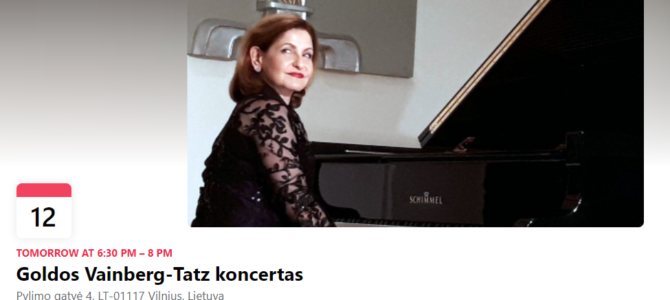
The Vilnius Jerusalem of Lithuania Jewish Community presents a solo concert by the pianist Golda Vainberg-Tatz to be held at 6:30 on Thursday, May 12, on the third floor of the Lithuanian Jewish Community in Vilnius. She will perform works by Bach, Beethoven and Chopin. The event is free and everyone is invited.
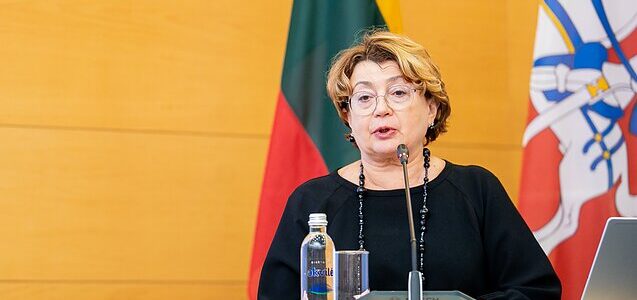
The Lithuanian Jewish Community is inviting Litvaks from around the world to come to Vilnius from May 23 to May 26, to visit the land of their ancestors and to take part in the Fifth World Litvak Congress. The four-day congress has a program which includes discussions, tours of historical sites and different cultural activities dedicated to Jewish heritage in Lithuania and achievements by Litvaks on the world stage.
Events include the opening at the Lithuanian parliament and a concert by American cantor and professor Joseph Malovany at the Choral Synagogue in Vilnius in an evening of concerts called “A Date with Vilne” which will include Lithuanian musicians and actors paying homage to the memory of the Jews who lived and worked in Lithuania.
Lithuanian parliamentary speaker Viktorija Čmilytė-Nielsen is the official patron of the Fifth World Litvak Congress. She said: “This Litvak Congress is happening while aggression is running wild in the Ukraine, when war fever has infected the entire region, which is significant to Lithuania historically and today, and to the entire world of Yiddish culture. In the face of blind brutality and violence it is always important to emphasize humanitarianism, empathy, the highest spiritual values from which the long Litvak tradition has always taken strength. This is especially urgent today when in the east of Europe an aggressive and imperialistic anti-Semitism has again raised its head, distorting historical facts and manipulating peoples’ emotions. We must oppose this.”
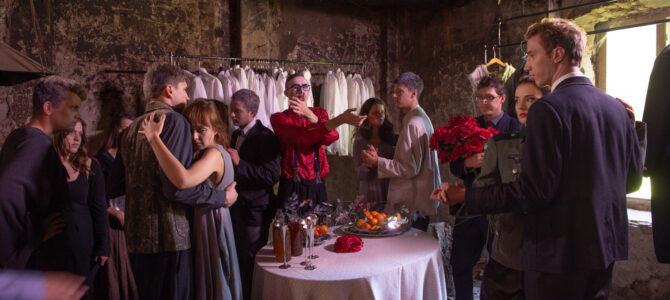
Following the commemoration of Holocaust victims at the Ponar Memorial Complex outside Vilnius on Yom haShoah, Holocaust Remembrance Day, on April 28, a screening of Julius Dautartas’s film Getas [Ghetto] took place at the Lithuanian Jewish Community.
This feature film is based on true events. The location is the Vilnius ghetto set up by the Nazis. It tells the story of the ill-fated, illegal and completely unequal love between Austrian SS officer, amateur musician and true psychopath Bruno Kittel who was placed in charge of the Vilnius ghetto and later the Kaunas concentration camp, and Jewish songstress Khaya. It is claimed that the theater which was established in the Vilnius ghetto was the result of Kittel’s love for Khaya.
Hermann Kruk in his Vilnius ghetto chronicle records some of the consternation ghetto inmates felt about the creation of the new cultural institution in their place of torment. Kruk records the phrase “whistling in the graveyard,” meaning while mass murder was taking place, the people were distracted with the spectacle of plays and drama.
The idea overcame resistance, however, and the cultural life of the Vilnius ghetto became a force for resistance and ultimately survival.
Full interview with the director in Lithuanian here.
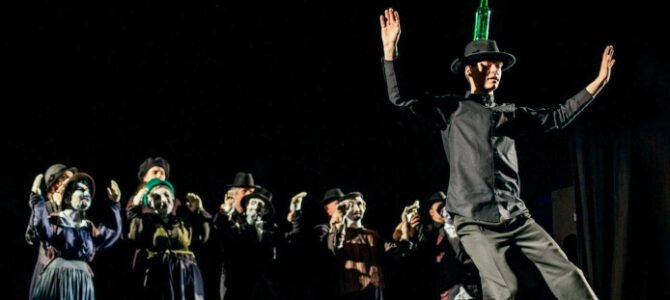
A new play called Jokūbo dienoraštis [Jacob’s Diary] intended to introduce young audiences to the topic of the Holocaust premiered at the Kaunas State Puppet Theater Sunday evening, May 8, 2022.
What Remains When, after the War, Nothing Remains
lrytas.lt
“This is the story of the fate of a small town during World War II,” director Milda Mičiulytė said.
Full story in Lithuanian here.